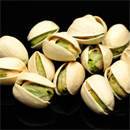 You just might have to add pistachios to the list of foods that help with digestion. And potentially so much more. A new study found that this healthy food may in fact support the amount of healthy bacteria in our guts. The ones that keep us running smoothly and keep the entire gastrointestinal system disease-free.
You just might have to add pistachios to the list of foods that help with digestion. And potentially so much more. A new study found that this healthy food may in fact support the amount of healthy bacteria in our guts. The ones that keep us running smoothly and keep the entire gastrointestinal system disease-free.
Researchers found that eating pistachios may alter levels of potentially beneficial bacteria in the gut. This brand-new health breakthrough was presented to experts only last week at a conference. It’s the first study of pistachios and almonds and their modulating role on the gut bacteria levels.
RECOMMENDED: More on pistachios as a good-health snack.
Pistachios contain non-digestible fiber, which remains in the gut and serves as food for naturally occurring bacteria. They also contain phytochemicals that may boost bacteria levels. As a prebiotic food, pistachios may enhance the growth of beneficial bacteria in the digestive tract.
In the study, 16 healthy people ate a planned diet with either three ounces or 1.5 ounces of pistachios and almonds per day, or none of the nuts at all. They had calorie-controlled diets and researchers measured the level of lactic acid bacteria and “Bifidobacteria,” two groups of live microorganisms in the gut, in the stool.
After 19 days, the three-ounce group (about two servings) had greater levels of gut bacteria — including those that produce “butyrate.” Butyrate is a preferred energy source for cells in the colon that is believed to maintain health in that area. Almonds did not lead to such increased levels of bacteria.
This helps show that nuts contain incompletely digested foods, and special natural chemicals that are required for a healthy field of bacteria in the intestinal tract. Researchers call this a promising sign that eating more nuts, particularly pistachios, helps create more disease-preventing bacteria. And in this way, they would fall into a group similar to probiotic-rich yogurt.
Quick notes on pistachios: one ounce nets you 160 calories and three grams (12% of daily value) of dietary fiber. They are also excellent sources of vitamin B6, copper, and manganese and a good source of phosphorus and thiamin.
